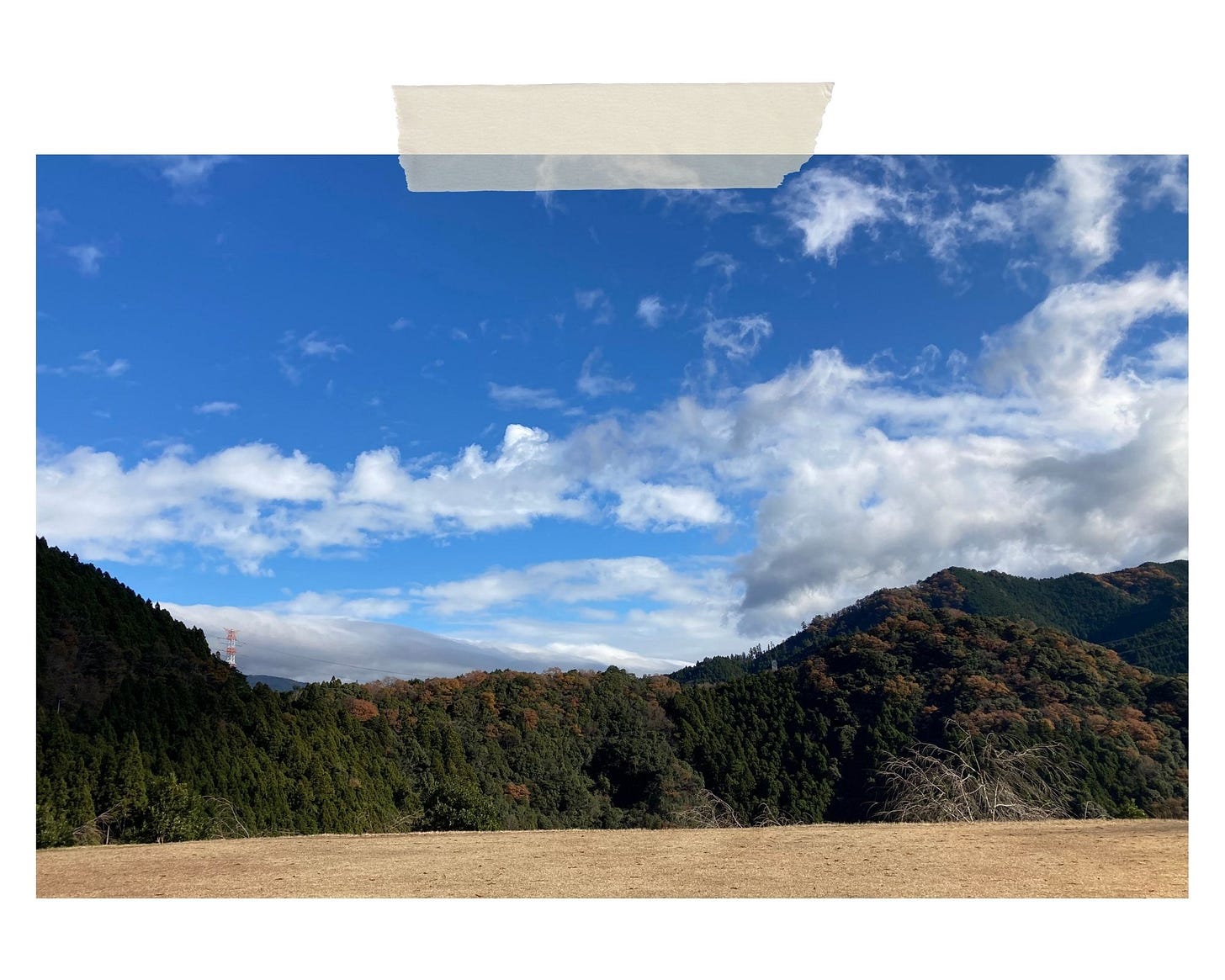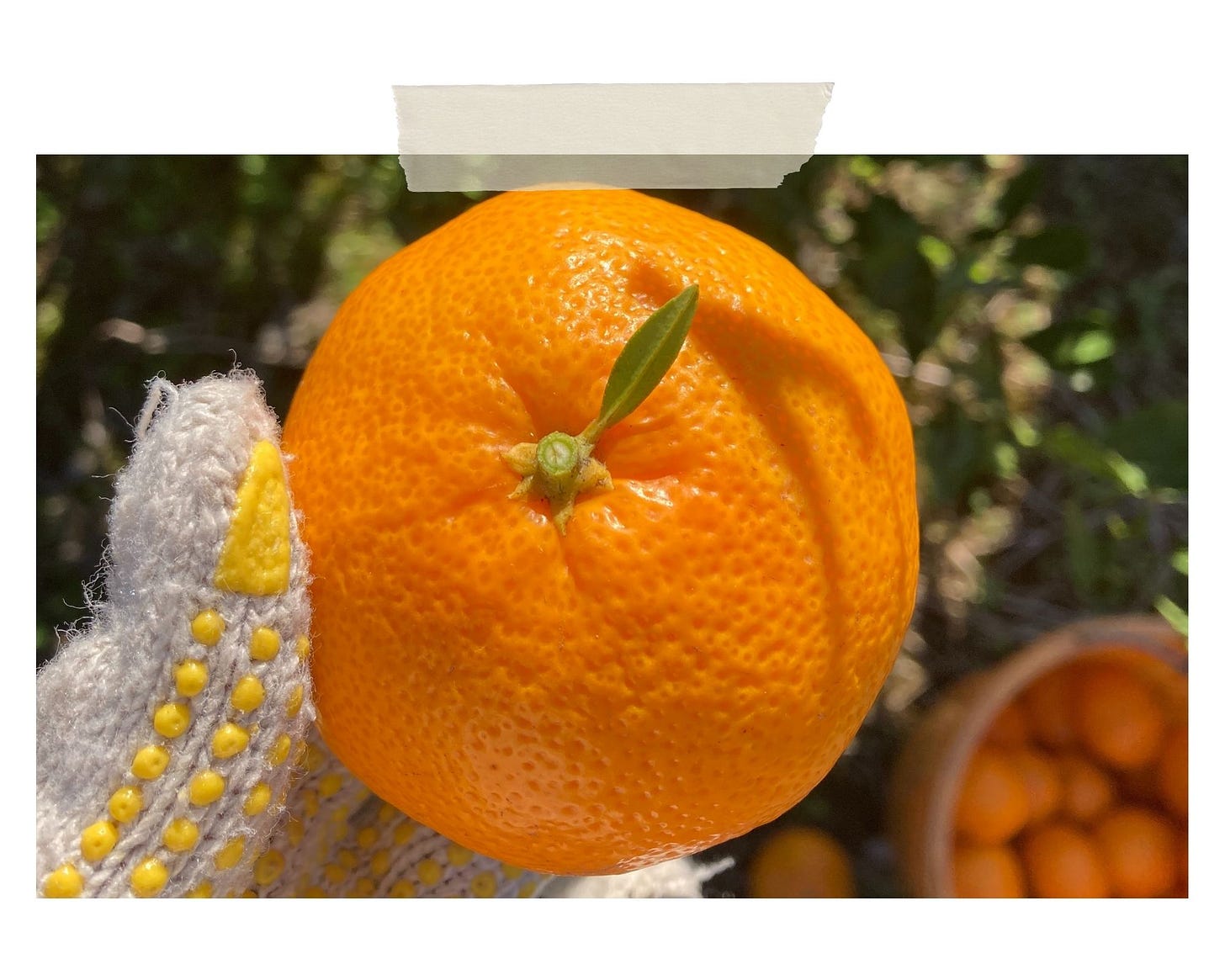you are worthy of rest
welcoming winter in Kamikatsu
Hello reader, thanks for being here! I’m Kana and this is Tending Gardens, which you can read about here. If you like it and want more like it in your inbox, consider subscribing.
Happy Sunday afternoon or Happy Monday morning,
It’s now over a month that I haven’t written an update and it feels wonderful to finally carve out this space to allow myself to write again. If I’m to think about the reason(s) I haven’t written, I’m tempted to simply say ‘I’m busy’. But I’m apprehensive, or maybe cautious, at using words because it’s only half the picture. If I’m holding the reasoning ‘I’m busy’ in one hand, perhaps the other hand is clutching onto the words ‘I’m in need of rest’.
I won’t dwell too much on the words ‘I’m busy’ since it feels so commonplace, in the worst way possible. ‘I’m busy’ means a full calendar of tasks to accomplish, people to see, and so on and so on. Those words somehow feel tied to the pressure society puts on us to be constantly productive. Our self-worth should not be tied to our output (or busyness). Our lack of sleep, packed schedules of meetings, and demanding workload should not be a badge of honour but a moment to carefully reflect on the impact it might have on our health and wellbeing. Particularly in Japanese society long work hours is the norm or (worse) something to be praised, so many say ‘I’m busy’ with a smudge of pride. Harmful.
So diverging from busyness, I’ve been thinking (instead) about rest. Rest is not a reward. We don’t have to earn rest. We need rest. We deserve to rest without feelings of guilt or shame. We are worthy of rest simply because you are human.
I see rest as listening to our bodies and leaning into our intuition. There are so many forms of rest—maybe we need sensory rest: stepping away from bright lights, computer screens, background noise; or emotional rest: instead of reacting to others' emotions we process our own; or creative rest: to stop doing and instead to observe and explore. Rest is so much more than physical rest.
I think that all rest comes down to slowing down and inviting mindfulness into our daily thoughts and actions. To rest is to be intentional.
welcoming winter in Kamikatsu
I’m writing from my home, which has transformed into a very, very cozy space—my attempt at coping with a cold winter in the mountains.
When I was living in Denmark for school, I quickly learned the word hygee or hyggelig (adj.), a Danish word for warm or relaxing. It’s a word that so perfectly describes all the elements that create a cozy feeling. From interior design to food to the type of candles that are lit at home, hygee also t’s also a mindset embedded into so many areas of Danish culture.
My months living in Denmark was a training ground for learning how to best cope with long, dark, cold nights. My home is now illuminated with a soft warm lamp, star-shaped hanging lights over the window, and a gas stove heater with a kettle on top. There are heaps of fluffy blankets and carpets, a kotatsu (low heated table), and a Christmas tree (which has been up since mid-November).
I have the quintessential hygge home. It’s so cozy that I’m starting to find myself smitten with winter in a way I haven’t really been in the past. Perhaps it’s the introvert in me (that seems to grow with age) that finds a great deal of comfort in retreating inwards into a space that feels so homey.
moments of joy this past month
Hosted a cyclist who’s travelling across Japan on his bicycle—unexpected and deep conversations about adventure and life
Invited to participate in a one week tour in the neighbouring prefecture, Ehime, to learn about tourism development in the region—so many moments of laughter and good food
Welcomed 6 friends to Kamikatsu (I completed my master’s program with 2 of them)—worlds colliding (community and friendships coming together and growing abound) is perhaps one of the happiest feelings
Celebrated a friend’s birthday over an array of seafood and sakes
Completed an INOW program after a short pause—a reminder of the joy of guiding, teaching, and facilitating experiences
Spent many afternoons picking mikan (tangerine oranges), which are in season and grown in abundance in this area
This season (end of the year, Christmas, New Year’s…) can be a lot. It can be a lot physically, mentally, and emotionally. Finding and making time for rest can feel daunting, but it’s okay if rest isn’t perfect. A reminder as much to myself as for anyone who might need to hear it: make enough time to get rest that will carry you through more challenging times.
We will make it through. We can do this.
Take care, take rest,
Kana
I’d love for you to think of me as your penpal—sharing a note from a tiny village in Japan. With Tending Gardens, I want to bring you a small joy in the form of a newsletter. If you like it and want more like it in your inbox, consider subscribing.







A very insightful essay. I just wrote a short piece where I consider the good things that happened because of the pandemic that I hope will stay in my life even when the virus is finally put to sleep. One of them is the slower pace of life that the pandemic has imposed on me.
You may want to read another piece I wrote on a slightly different but similar subject: the art of idling. https://giannisimone.substack.com/p/the-joy-of-idling-and-sharing
Your reflections on the English word "busy" made me consider the relationship between busyness and business -- how our hyper commercial/capitalized world leads us to a temporal deficit. I think you're on to something with prizing coziness and rest! <3